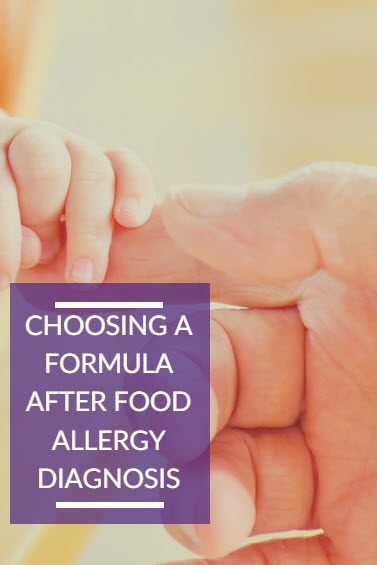 When choosing a formula after a food allergy diagnosis, how can you tell the difference between various formula types?
When choosing a formula after a food allergy diagnosis, how can you tell the difference between various formula types?
When your little has a cow milk allergy, the doctor will walk you through management options. The first should be for mom to eliminate dairy and for baby to keep breastfeeding. However, sometimes a formula is necessary to supplement or replace breast milk.
Nutrition questions and navigating feeding options can overwhelm even the most seasoned parent. As a family living with food allergies, you know how quickly questions pile up regarding food and nutrition. Let’s take a look at the main types of infant formulas and how they are different. We’ll also highlight which are options in the case of a cow milk allergy to help you in the process of choosing a formula.
Cow Milk-based Formulas
Most infant formulas available in the grocery store are based on cow milk. That means they contain cow milk protein. It’s important to remember that protein is the part of food that triggers allergic reactions. Because these formulas contain whole protein from cow milk, they are not suitable for managing cow milk allergies. Milk protein is THE most common food allergen for infants and young children. For children with cow milk allergy, these formulas are just not an option.
Soy-based Formulas
When avoiding cow milk proteins and dairy foods, many parents assume soy-based infant formulas are a suitable substitute. Soy formulas are based on soy instead of cow milk. That means they contain soy protein instead of cow milk protein. Companies market these formulas for patients with lactose intolerance and galactosemia, which are not common in infants.
Experts now estimate that up to 60% of children with an allergy to cow milk are also allergic to soy protein. For this reason, expert groups in the US advise that infants with cow milk allergy not take a soy formula. Global allergy experts make the same recommendation.
In addition, a leading European pediatric society* recommends that:
- Soy-based formulas are not for the initial management of food allergy in infants
- Soy-based formulas should not be used in infants with food allergy during the first six months of life
Hydrolyzed Formulas
Hydrolyzed formulas contain milk proteins that hydrolyzed, or in smaller pieces than whole protein. Hydrolysates is another name for this type of formula. There are two broad categories of protein hydrolysates:
- Partially hydrolyzed formulas (pHF) – These formulas use protein that’s been broken down into smaller parts (these are called peptides). These formulas are not hypoallergenic and not suitable for children allergic to milk. You will not see the word “hypoallergenic” on the label.
- Extensively hydrolyzed formulas (eHF) – The protein in eHFs is in smaller pieces than pHFs. Most eHFs are hypoallergenic – check the label to be sure. However, studies have found that up to 10 to 40% of babies with cow milk allergy do not tolerate eHFs. That means their CMA symptoms will not fully relieve. If you’re concerned that your little one isn’t tolerating an extensively hydrolyzed formula, ask your baby’s doctor about amino acid-based formulas like Neocate.
Amino Acid-based Formulas
Neocate is an amino acid-based formula, also known as an elemental formula. Amino acid-based formulas do not contain any intact protein or peptide chains. Instead, they contain the original building blocks of all proteins – amino acids. Amino acids are the most basic unit the body can use for protein, the easiest form to digest and absorb.
Free amino acids cannot trigger an allergic reaction by the body’s immune system. They’re so small that the immune system can’t “see” them the way it sees proteins and peptides. Neocate offers the widest range of amino acid-based nutritional products for different age groups and conditions.
*European Society for Pediatric Gastroenterology Hepatology and Nutrition (ESPGHAN)
Choosing a Formula After Food Allergy Diagnosis, last updated April 2018






